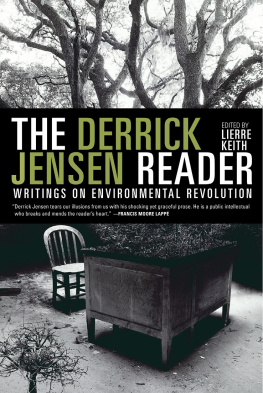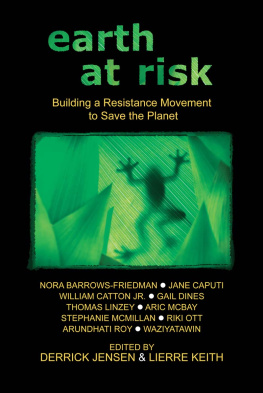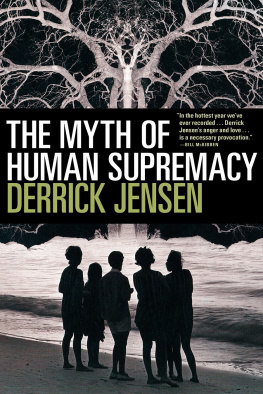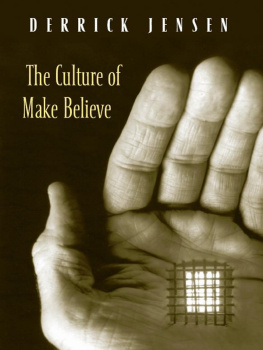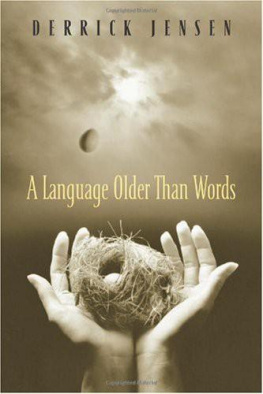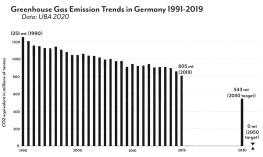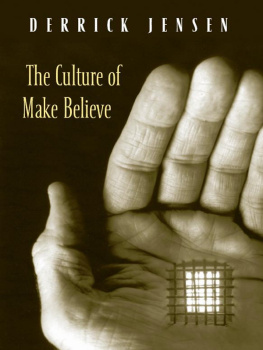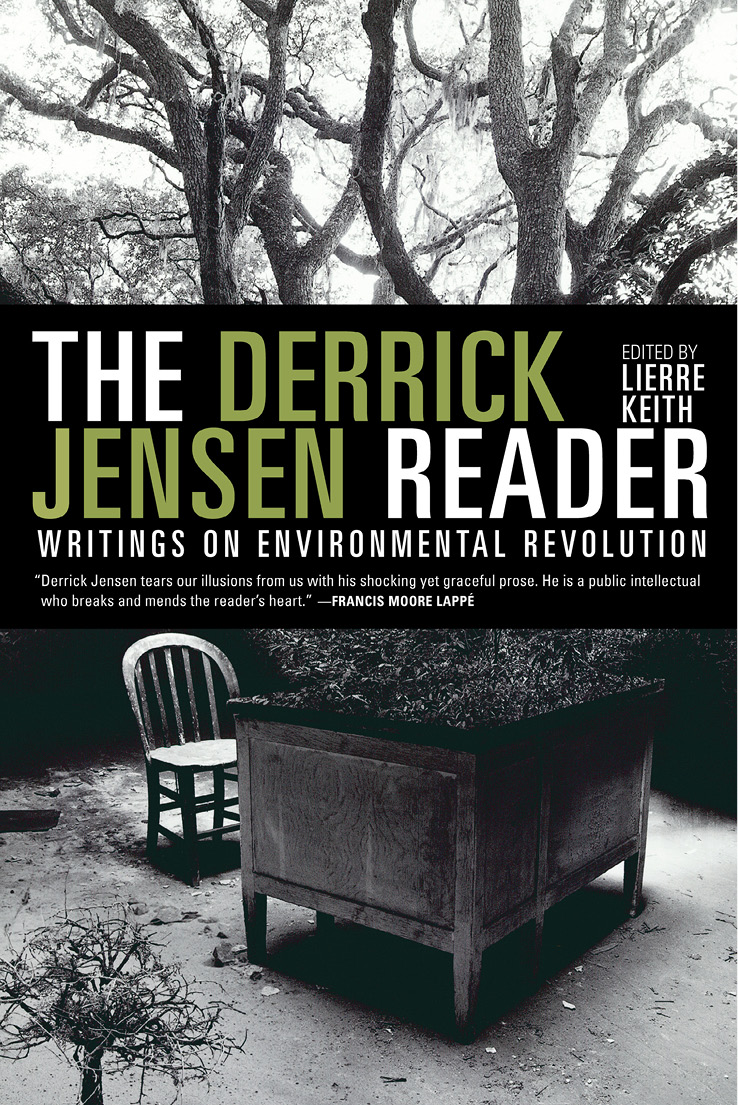
The
Derrick Jensen
Reader
Writings on Environmental Revolution
edited by LIERRE KIETH
Seven Stories Press
New York
Copyright 2012 by Derrick Jensen and Lierre Keith
A Seven Stories Press First Edition
All rights reserved. No part of this book may be reproduced, stored in a retrieval system, or transmitted in any form or by any means, including mechanical, electric, photocopying, recording, or otherwise, without the prior written permission of the publisher.
Seven Stories Press
140 Watts Street
New York, NY 10013
www.sevenstories.com
College professors may order examination copies of Seven Stories Press titles for a free six-month trial period. To order, visit http://www.sevenstories.com/textbook or send a fax on school letterhead to (212) 226-1411.
Library of Congress Cataloging-in-Publication Data
Jensen, Derrick, 1960
The Derrick Jensen reader : writings on environmental revolution / Derrick Jensen, edited by Lierre Keith.
p. cm.
Includes bibliographical references.
ISBN 978-1-60980-404-6 (pbk.)
eISBN 978-1-60980-405-3 (ebook)
1. Environmentalism. 2. Human ecology. 3. Sustainable living. 4. Environmental degradation. 5. Environemental responsibility. I. Keith, Lierre. II. Title.
GE195.J46 2012
304.2--dc23
2012009238
Contents
(with George Draffan)
(with George Draffan)
: The Problem of Civlization
: Resistance
(with Karen Tweedy-Holmes)
(with Stephanie McMillan)
(with Aric McBay)
Essay:
Essay:
, by Lierre Keith
Preface
The dominant cultureWestern Civilizationis driven by a death urge, an urge to control, an urge to violate, an urge to destroy life. Unless it is stopped, it will kill every living being on the planet, every living being it can.
Fourteen years ago I wrote what has become one of my most quoted passages: Every morning when I wake up I ask myself whether I should write, or blow up a dam. Yet Im not always convinced Im making the right decision. Ive written books and Ive been an activist. At the same time I know neither a lack of words nor a lack of activism kills salmon here in the Northwest. It is the presence of dams.
In the time since, things have gotten much worse for salmon, and for the earth. By now we all know the numbers, or we should. Two hundred species per day driven extinct, 90 percent of the large fish in the oceans extirpated, more than 98 percent of native forests destroyed, 99 percent of prairies, and on and on. Every biological indicator is going in the wrong direction. Native communitieshuman and nonhumanare under assault. Just where I live, frog populations have collapsed, as have newt populations, butterfly populations, crane fly populations, dragonfly populations, banana slug populations, songbird populations. Crow populations have collapsed. Bat populations. Wooly bear populations. Harvestmen populations. Moth populations. Bumblebee and solitary bee populations. And these are just some of those Ive noticed. Salmon have continued to collapse. I give salmon fifteen years. If we can bring down civilization in fifteen or twenty years, I think salmon will be, in time, fine. Much longer and they will not survive.
Far too many of us have forgotten, or never knew, that words can be weapons to be used in the service of our communities. Far too many of us have forgotten, or never knew, that words should be used as weapons in the service of our communities. For far too long too many critics and too many teachers have told us that literature should be apolitical (as though this is possible), and that even nonfiction should be neutral or objective (as though these, too, are possible). If you want to send a message, theyve told us too many times, use Western Union. I once spoke with a nature writer who refused to lend his name to a campaign to protect a species about whom he had written, giving as his reason, Im a writer, damn it. I have to remain neutral.
When the world is being murdered, such a position is inexcusable and immoral. Its also really boring. Further, its ignorant of literatures history, and of what it means to be a real writer. Have these people never heard of Steinbeck, Dickens, Crane, Hugo? Charlotte Perkins Gilman? Rachel Carson? Frederick Douglass? Harriet Beecher Stowe? Alexandra Kollantai? George Eliot? Katherine Burdekin? Zora Neale Hurston? Andrea Dworkin? B. Traven? Upton Sinclair? A little Tolstoy, anyone?
A few years ago I read a book that for me epitomizes the emptiness of the modern movement toward apolitical literature. It was a book called The Diving Bell and the Butterfly , and was a memoir of someone who had a stroke and lost the ability to voluntarily move any part of his body except to blink one eye. He eventually was able to begin communicating this way, and wrote a book. I read it because I saw so many reviews calling the book a triumph and an important piece of modern literature. I hated it, though, primarily because prior to his stroke the protagonist was a narcissistic, self-pitying, nature- and woman-hating asshole, and after the stroke, well, he was a narcissistic, self-pitying, nature- and woman-hating asshole. But the failure of that book is not why I mention it here. I mention it because as I was reading it, something kept niggling at me, and finally near the end I realized what it was. This book has essentially the same plot as Dalton Trumbos Johnny Got His Gun , which is about a soldier in World War I who wakes up in a hospital and slowly realizes he was hit by a bomb, and has lost his hearing, his vision, his arms, his legs, his face. The only way he can communicate is by tapping his head against the pillow. But in this novel, written some eighty years ago, the character isnt a narcissistic self-pitying asshole, but rather becomes an anti-war messiah. The book has moved me to tears each time Ive read it, and is one of the most powerful anti-war novels ever written.
That trajectory, from Johnny Got His Gun to The Diving Bell and the Butterfly , mirrors for me the degradation of too much modern literature.
I will not participate in that degradation. It is long past time we allwriters and readers alikebegan working to restore and maintain a literature of justice, resistance, and revolution.
I recently received a note from the writer John Keeble, who twenty years ago was my teacher at Eastern Washington University, telling me hed been following my work. He wrote, I know youve been writing and that among some circles youre famous, which at once fills me with pride and bemuses me because I know well that nothing matters to you as much as the issues.
Hes right, and he articulates well my own split feelings about what I have or have not accomplished with my work.
I would not be who I am and I would not write what I write without having learned from some of my elders who did not believe that writers should or can be apolitical. As one writer said to me, We are all holding hands through time, helping to make an unbroken line of resistance. Or as another insisted, The truth is most important. It is more important than money. It is more important than fame. It is more important than your career. Its more important than your preconceptions. Follow the truthfollow the words and ideaswherever they lead. Yet another said, When you lie to readerswhether this lie is something as small as an incorrect word or as large as a wrong idea; and whether this lie is explicit or by implicationyou are stealing from them, stealing their time and stealing their hearts and minds. Another said, No matter how you try, you cannot separate art from politics. So-called apolitical art supports the status quo.
Next page
